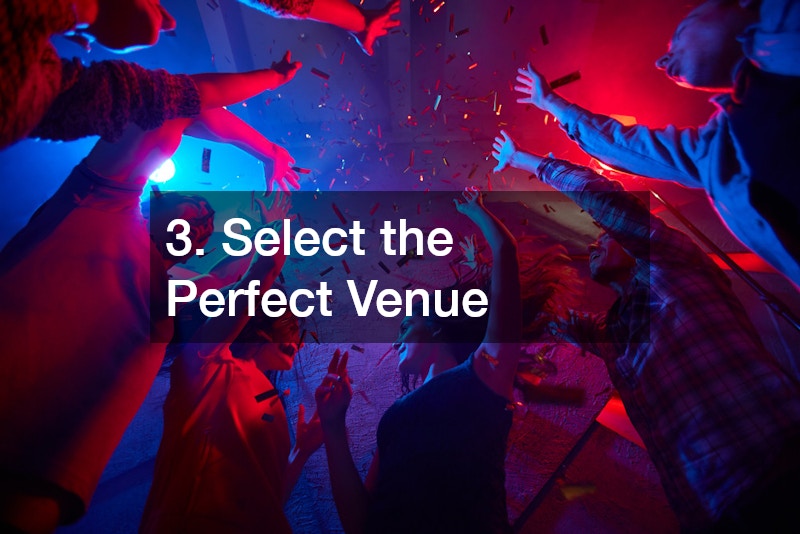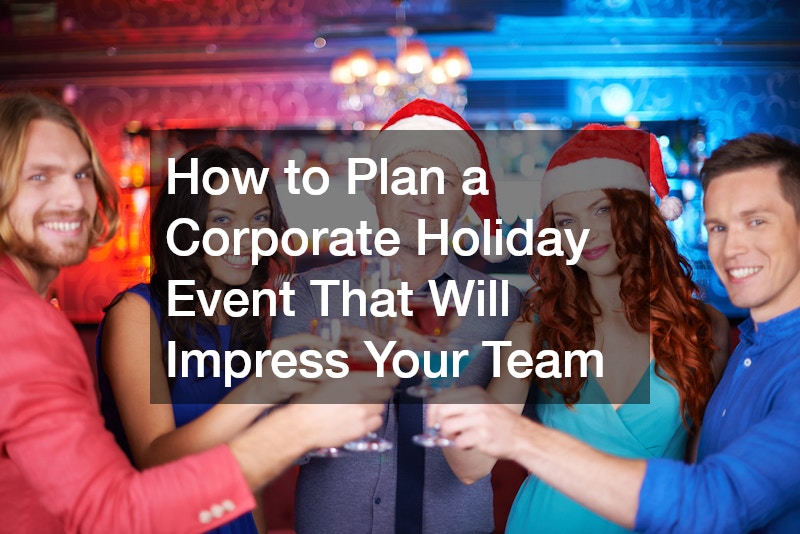Planning a corporate holiday event can be a daunting task, but it’s also an opportunity to foster team spirit, show appreciation for your employees, and reinforce company culture. Whether you’re organizing casual gatherings or high-end corporate events, well-executed holiday events can leave a lasting impression and create positive memories that contribute to employee satisfaction and retention. If you want to plan an event that your team will be talking about long after the last toast, here’s a comprehensive guide that will ensure success.
Why Holiday Events Matter for Corporate Culture

Holiday events serve as a crucial component of corporate culture. They give employees a chance to unwind and socialize in a more relaxed setting, helping them build stronger relationships with colleagues across departments. These events are also an opportunity to recognize hard work and boost morale during a time when teams might be feeling the pressure of year-end deadlines.
Furthermore, corporate holiday parties allow companies to showcase their appreciation for employees’ dedication throughout the year. Whether through small tokens of gratitude or more elaborate celebrations, these events create a sense of belonging and make employees feel valued. As a result, this sense of appreciation contributes to a more engaged and loyal workforce, which is vital for long-term success.
1. Set Clear Goals for Your Corporate Holiday Event
Before diving into the logistics of planning your corporate holiday event, it’s important to establish clear goals. Why are you hosting this event? What do you want to achieve?
Define the Purpose:
Understanding the purpose of the event will guide every decision you make. If the goal is to celebrate team achievements, the event should include a ceremony or awards presentation. If it’s about fostering relationships between departments, opt for team-building activities or networking opportunities. A party focused on celebrating the company’s success could include speeches from leadership or a recap of the year’s highlights.
Set Specific Objectives:
Consider setting measurable objectives for the event. For example, you might aim to have at least 80% of employees attend, or you could set a goal to make employees feel 20% more connected to each other, as measured by a post-event survey. These objectives will help you measure success and ensure that your event aligns with the company’s strategic goals.
2. Choose the Right Date and Time
Timing is everything when it comes to planning a successful corporate holiday event. Picking the right date and time can ensure maximum attendance and participation.
Consider Your Team’s Schedule:
The holiday season can be a busy time for employees. Consider their work schedule and potential personal commitments when selecting a date. Avoid overlapping with industry events, deadlines, or company-wide initiatives. A Friday afternoon or evening event can offer a more relaxed atmosphere, while a mid-week lunch could appeal to those with personal obligations over the weekend.
Think About Time of Day:
Time of day is also an important consideration. For instance, a lunch event is ideal for those who want to keep it low-key, while a dinner or evening party allows for more elaborate entertainment options. If your team has a variety of schedules, consider offering flexibility, like a drop-in event where people can come and go as they please.
3. Select the Perfect Venue

The venue you choose will set the tone for the event. It should be accessible, appropriately sized for your team, and reflect the company’s culture.
Location and Accessibility:
The location should be convenient for employees to get to, whether it’s a nearby restaurant, hotel ballroom, or a unique venue like a museum or brewery. Make sure there is enough parking or transportation options, especially if some employees rely on public transit or ride-sharing services.
Size and Ambiance:
The venue should comfortably accommodate your expected number of guests without feeling cramped. Choose a venue that provides the ambiance you want to create. A cozy, intimate setting might suit smaller teams, while a grand event venue is more fitting for larger gatherings. Check if the venue allows for customization, such as the ability to decorate according to your event theme or incorporate your company’s branding.
Outdoor Spaces:
If your team enjoys a more relaxed or unique experience, consider a venue with outdoor or specialized spaces. This could include an outdoor terrace, garden, or rooftop for a refreshing setting. Additionally, if your team includes smokers or vapers, look for a venue that offers a designated smoking area. These specialized spaces ensure that everyone can enjoy the event comfortably and in an environment that suits their preferences, creating a more inclusive and enjoyable experience.
4. Budgeting and Managing Costs Effectively
Budgeting for a corporate holiday event is one of the most important aspects of the planning process. A well-managed budget will ensure that the event is both memorable and cost-effective.
Create a Detailed Budget:
Start by outlining all potential costs, including venue rental, catering, entertainment, decorations, transportation, and gifts. If you’re planning an outdoor event, be sure to account for porta john rentals to ensure the comfort of your guests. It’s important to allocate your budget according to your priorities. For example, if food and entertainment are key to your team’s enjoyment, you may choose to allocate more money in those areas while cutting costs elsewhere.
Plan for Unexpected Costs:
Leave room in the budget for unforeseen expenses. For example, if you’re hosting an outdoor event, you might need generator services to ensure a reliable power source for lighting or equipment. Unexpected costs could also include last-minute changes, additional decorations, or upgrades in services. Planning for these contingencies will help you avoid stress as you approach the event’s final stages.
Track Expenses:
Use an online tool or spreadsheet to track your expenses as you book services and purchase supplies. This will help you stay within budget and make adjustments if necessary.
5. Event Themes and Ideas to Suit Your Team

The theme of your corporate holiday event can set the stage for a fun and engaging experience. Whether you’re opting for a traditional approach or something more creative, the key is to align the theme with your team’s preferences and company culture.
Traditional Festivities:
If your team enjoys classic holiday celebrations, you can go for a formal or semi-formal event with traditional holiday décor like Christmas trees, wreaths, and festive lighting. These timeless themes can bring a sense of warmth and familiarity to your event.
Winter Wonderland Theme
Transform your venue into a frosty, magical landscape. Use fake snow, sparkling white lights, and frosted trees to create a serene winter atmosphere. Pair this with elegant holiday music and hot cocoa bars for a cozy, enchanting vibe. For a more upscale touch, consider adding ice sculptures or a formal dinner setting.
Black-Tie Gala
Host a sophisticated, high-end holiday celebration with a black-tie dress code. This type of event works well for teams that appreciate elegance and refinement. Think of rich colors like gold, silver, and deep red for décor, paired with formal sit-down dinners, champagne toasts, and perhaps even a live jazz band or string quartet for entertainment. A year-in-review slideshow or a holiday speech can add a personal touch to the evening. For an extra touch of luxury, arrange limo and party bus rentals to transport your guests in style and comfort.
Holiday Tradition Showcase
Create an event that highlights beloved holiday traditions. Include activities like a Secret Santa gift exchange, Christmas carol singing, or a holiday trivia game. Consider hosting a traditional Christmas dinner with turkey and all the fixings, or incorporating multi-generational holiday customs to make the event more inclusive.
Creative and Fun Ideas:
For teams that prefer a more relaxed or quirky vibe, think outside the box and embrace non-traditional holiday celebrations. A more creative theme can reflect your team’s unique interests, promoting a fun, inclusive atmosphere that breaks from the norm.
1980s Holiday Party
A nod to retro nostalgia, a ’80s-themed holiday party is full of neon colors, funky music, and pop culture references. Encourage guests to dress up in their best ‘80s fashion—think big hair, bold prints, and leg warmers. Include a playlist filled with iconic hits from the era and a photo booth with props like cassette tapes and Rubik’s cubes. You can add a playful twist with a themed karaoke competition, featuring songs from the ‘80s.
Tropical Christmas Theme
A warm-weather-inspired celebration is perfect for those who want to mix holiday cheer with a laid-back vacation vibe. Opt for a beachy atmosphere with tropical décor like palm trees, surfboards, and tiki torches. Offer festive drinks like piña coladas or margaritas, and serve light dishes such as seafood skewers, tropical fruit platters, and grilled meats. Encourage your team to wear Hawaiian shirts or summer dresses, creating a fun contrast with the typical winter holiday attire.
Holiday Around the World
Celebrate global traditions by bringing the flavors and festivities of different cultures to your event. Set up food stations with dishes and drinks representing various holiday customs, such as Swedish meatballs, Mexican tamales, or Italian panettone. Decorate different areas of the venue to reflect diverse holiday traditions, like a Japanese New Year corner with origami decorations or a traditional English Christmas corner with holly and ivy. This theme works well for a diverse team, promoting inclusivity and sparking curiosity about global cultures.
Outdoor Event Ideas:
Outdoor holiday events offer a refreshing change of scenery and provide the perfect setting for creating a relaxed, fun atmosphere. If your team enjoys being outside, these outdoor themes can infuse your holiday gathering with a sense of adventure and novelty.
Outdoor Bonfire & BBQ
For a cozy and casual event, host a bonfire gathering complete with outdoor seating, string lights, and a BBQ grill. Serve comfort food like hot dogs, burgers, and roasted marshmallows, and encourage team members to mingle around the fire. Activities like a tug-of-war competition, a snowball toss, or even storytelling around the fire can make for a fun, interactive experience. To ensure your team is comfortable throughout the event, consider having portable toilets available to accommodate guests.
Winter Olympics
For teams that enjoy a little friendly competition, a winter-themed Olympic event can be a blast. Host outdoor games such as snowshoe races, sledding contests, and a snowball throwing challenge. You can also include team-building activities like relay races or obstacle courses, with medals awarded to the winning teams. To keep spirits high, provide cozy fire pits and warming drinks like mulled cider or hot chocolate.
Outdoor Movie Night
Take advantage of the winter chill with a cozy outdoor movie night. Set up a large screen in a park or open area, with plenty of blankets and outdoor seating to keep everyone comfortable. Show holiday classics, such as Home Alone or A Christmas Story, and serve popcorn, hot cocoa, and holiday-themed snacks. This relaxed setting is perfect for winding down after a busy year.
Christmas Picnic in the Park
If the weather permits, host a holiday picnic in a local park. Bring blankets, festive picnic baskets filled with seasonal treats like gingerbread cookies and turkey sandwiches, and outdoor games such as frisbee or a holiday-themed scavenger hunt. This casual, relaxed setting encourages team bonding while enjoying the outdoors.
Outdoor holiday events offer a unique way to connect and celebrate, whether it’s through friendly competition, scenic tours, or cozy gatherings around a fire. They provide an opportunity to mix seasonal fun with fresh air and camaraderie.
6. Catering and Entertainment

A major factor in the success of your corporate holiday event is the food and entertainment. You want your team to be well-fed and entertained, so careful planning in these areas will enhance the overall experience.
Catering Options:
When choosing catering options, make sure to account for dietary restrictions, preferences, and the overall style of the event. A formal dinner with a plated meal might be perfect for a sit-down event, while a buffet can allow for more flexibility and variety.
For a more casual event, consider food trucks, grazing tables, or interactive food stations where guests can customize their meals. If you’re hosting an outdoor or casual gathering, a BBQ catering service can offer a fun and relaxed dining experience, with grilled favorites like burgers, steaks, and barbecue ribs.
Entertainment Choices:
Entertainment plays a crucial role in keeping the atmosphere lively. Options include live bands, DJs, or even karaoke to get employees to interact and have fun. If you want to engage employees in more interactive activities, consider games, trivia contests, or a photo booth. You could also hire a comedian, magician, or an entertainer to add a surprise element to the event.
7. Create a Memorable Atmosphere with Decorations and Branding
The atmosphere of your event can be shaped by your choice of decorations and how you incorporate your company’s branding.
Decorations:
Start by considering the vibe you want to create. Do you want an elegant setting, or something more playful and fun? Decorate the venue to reflect your event’s theme, whether that means twinkling fairy lights for a cozy feel, or luxurious table settings for a high-end dinner.
Adding personalized touches, like custom napkins or centerpieces with the company logo, can make your event feel more exclusive. Consider including a floral arrangement to bring a fresh and vibrant element to the space. Flowers for centerpieces are a classic way to add elegance and charm to the tables.
Branding Your Event:
Incorporating your company’s branding into the event helps reinforce its values and mission. Display your logo subtly on items such as gift bags, menus, and signage. Using your company’s brand colors for decorations and signage also ties the event back to the organization’s identity, creating a cohesive experience.
8. Recognizing Employees and Fostering Gratitude
Finally, corporate holiday events are the perfect opportunity to show your employees that you appreciate their hard work and dedication throughout the year. Recognizing their achievements will foster a sense of gratitude and strengthen team morale.
Employee Recognition:
Set aside time to acknowledge outstanding employees and teams. This could include handing out awards, presenting gifts, or delivering speeches that highlight individual and team accomplishments. Consider including awards in categories like “Employee of the Year,” “Most Creative Team,” or “Best Customer Service.”
Fostering Gratitude:
A key component of holiday celebrations is gratitude. Make sure to express thanks to your employees during speeches or throughout the event. You can also personalize your approach by offering handwritten notes or small tokens of appreciation, such as company-branded gifts or gift cards.
For employees who can’t attend the event, consider flower deliveries as a thoughtful gesture of appreciation. This will ensure they still feel recognized and valued, even if they’re unable to be present in person.
Closing Thoughts
Planning a corporate holiday event is an opportunity to reinforce your company’s values, build stronger relationships among your team, and celebrate achievements in a festive atmosphere. By setting clear goals, selecting the right date and venue, budgeting effectively, and incorporating thoughtful details, you can create an event that is memorable and impactful. When employees feel appreciated and recognized, they’re more likely to return to work motivated, excited, and eager to contribute to the company’s continued success.

